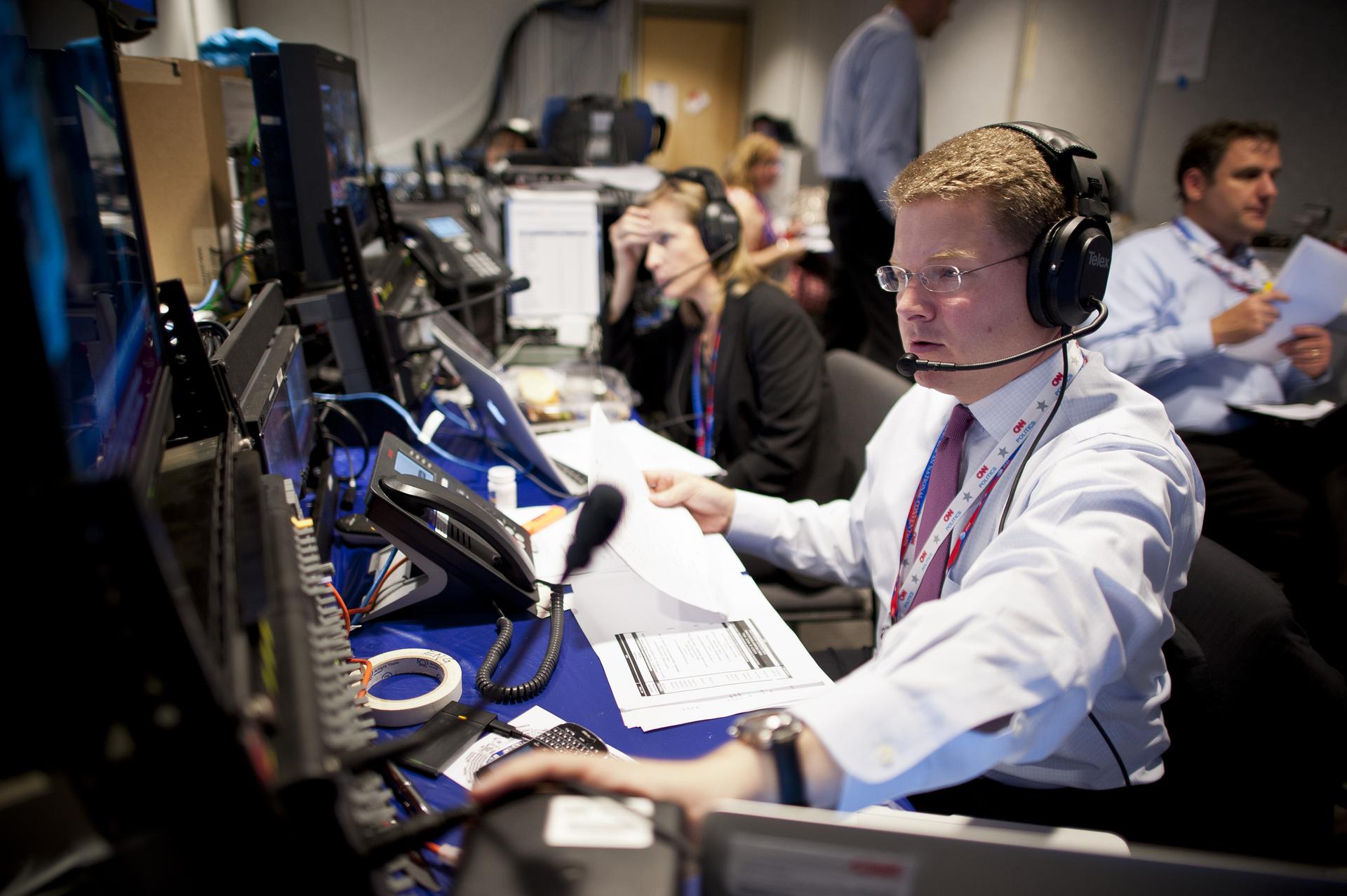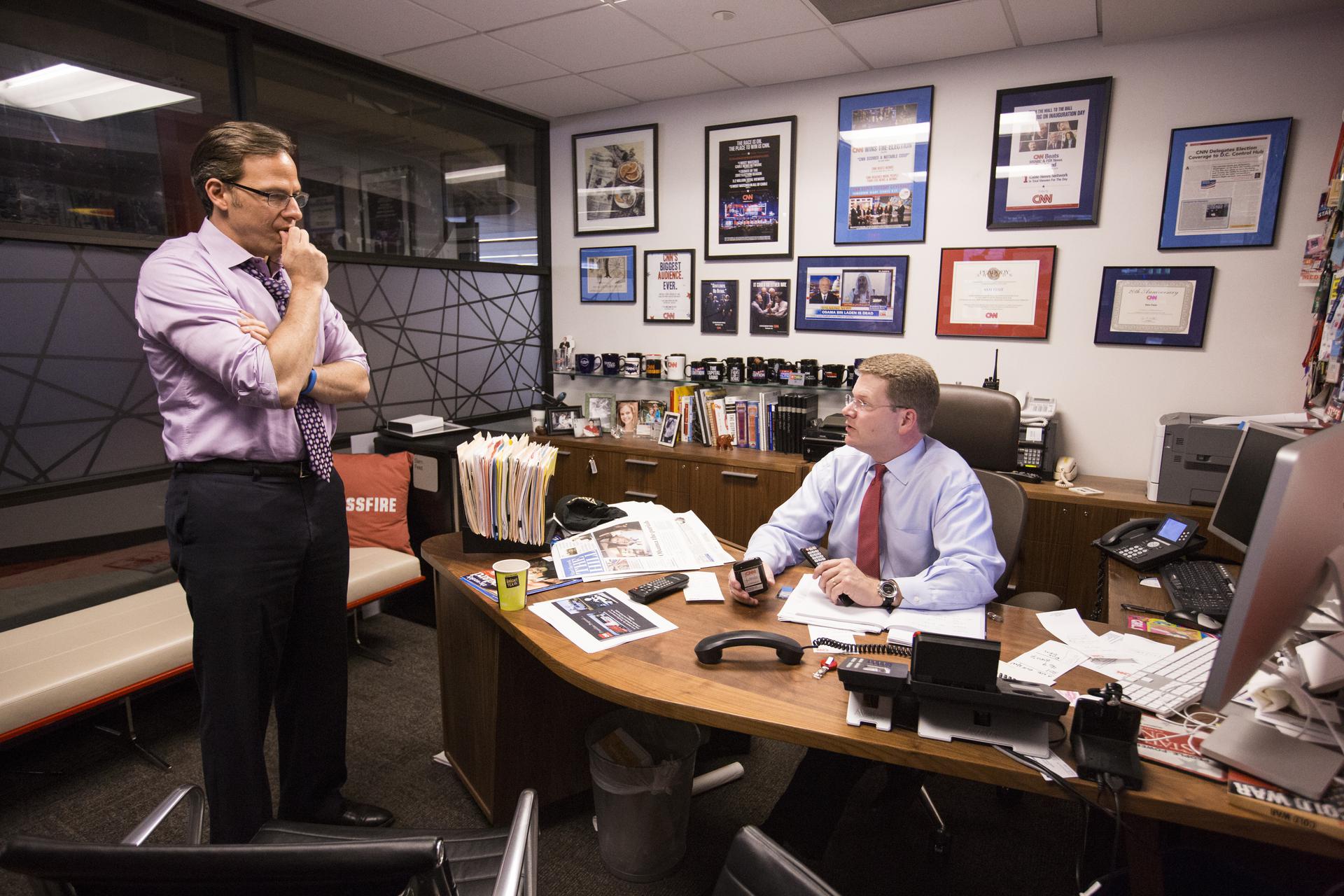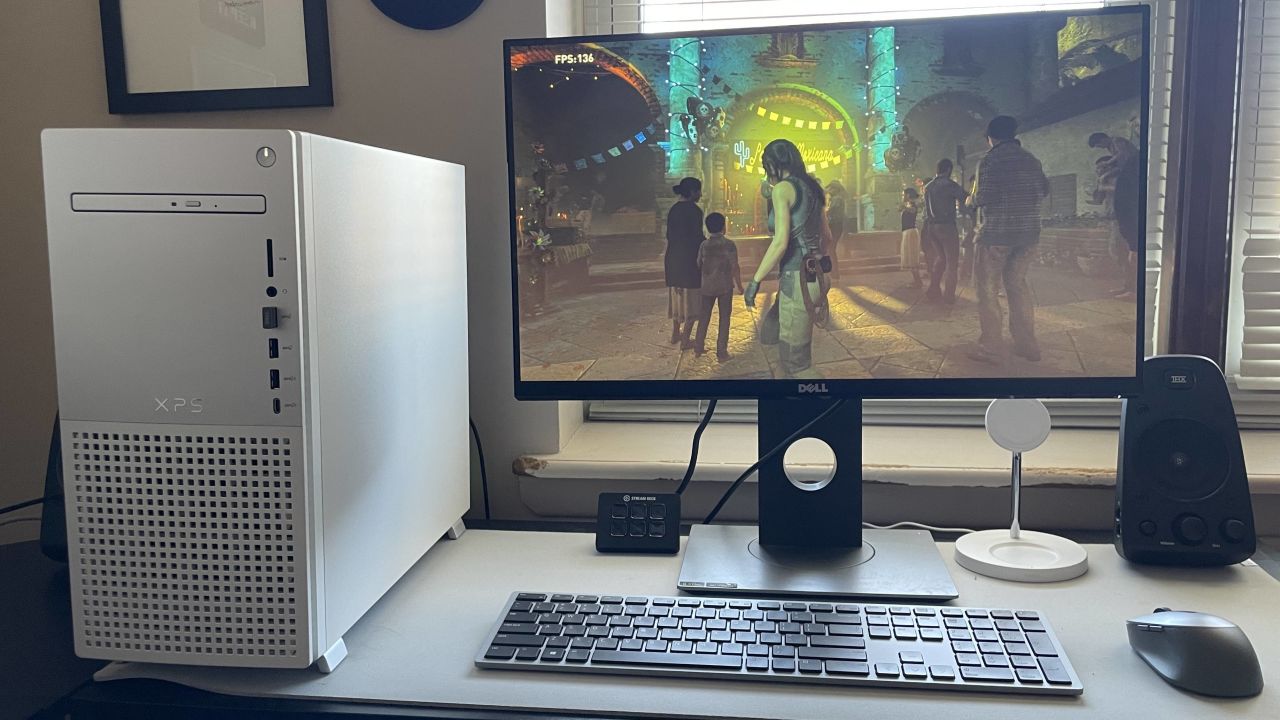
An exclusive inside look with your free CNN account
📼 how I got my start at CNN: Sam Feist
Sam Feist in the control room for the 2012 Republican National Convention. Photo credit: Edward M. Pio Roda
It’s always hectic for CNN Washington Bureau Chief and Senior Vice President Sam Feist, who oversees the operations of the DC bureau as well as CNN's internal fact-checking team and CNN's Special Events unit.
And when it’s a midterm election year, like 2022 is, he’s especially busy. That’s because Feist is in the middle of the network’s election coverage and is responsible for projecting the winners.
Feist is one of several CNNers who started at the network as entry-level employees and worked their way up. As part of an occasional series, we asked Feist to share how he had gone from taking orders to giving them, and what advice he has for aspiring journalists:
Tell us when and how you started at CNN.
I joined CNN as a video journalist at the CNN Center in Atlanta in 1991. That job followed a CNN internship in Washington and an internship and freelance stint in the London bureau at the beginning of the first Gulf War (in 1990). The video journalist job in 1991 involved running the studio camera, floor directing, operating the teleprompter, ripping and distributing paper scripts and ripping wire copy off of then already-old newswire machines.
What's your most memorable breaking news moment, and why?
Probably the night that the United States got Osama bin Laden in May 2011. I had just become bureau chief and I got a call at 9 on a Sunday night from the White House press secretary, who told me that the President (Barack Obama) was going to address the nation at 10 p.m. but refused to say why. We immediately went into action with anchors and correspondents racing into the Washington bureau for this mysterious announcement. We quickly learned it was bin Laden, and not only was CNN on the air first, but that news event also turned out to be one of the best breaking news specials I’ve been a part of.
Feist in his DC office with CNN’s Jake Tapper Photo Credit: David S. Holloway
Is there a job or responsibility you had that no longer exists today because of technology?
My second job at CNN was as a video playback operator: I was the person who loaded and cued videotapes in rapid succession to be played on live TV. It was among the most stressful jobs I’ve ever had. Imagine picking up a 3-feet-tall stack of videotapes from the library and moving that stack, already in order, into the playback room, which contained a rack of tape playback machines. Just imagine what happens if you drop the stack of tapes right before air. That happened. The world is a better place without videotape.
How has starting as a video journalist (VJ) shaped your perspective today?
When you start at the bottom and you hold a dozen or more jobs within an organization, you really learn how a news operation works. You learn that, for example, if you are a television producer and you change the rundown of a show, it will immediately impact a dozen different people, from the video producer to the teleprompter operator to the electronic graphics operator to the director, the technical director and many more. The same is true about changing a script for a news package or making a change to the front page of CNN.com. A team leader needs to communicate clearly and deliberately and also needs to consider how that communication impacts each person down the line.
What advice do you have for the upcoming generation of journalists?
Don’t pigeonhole yourselves into one “platform.” At a place like CNN, you have an extraordinary opportunity to move between newsgathering, show production, audio, field production, digital and back again. A great journalist is a great journalist. We can teach you the ins and outs of producing a news package, a newscast, a podcast or a digital story, but we can’t teach you how to be curious and well informed. Take risks on your career and move around between the platforms, because the more experiences you have, the more valuable you are. And likely the more interesting your career will be.
📥 Subscribe to CNN's What Matters newsletter and get a breakdown of the biggest political, cultural and economic stories in your inbox Sunday through Friday.
|
|
💳 CNN insider rec of the week
Brought to you by CNN Underscored
Traditional desktop computers still have a lot of value these days, especially at a time when working from home is the norm for many. The newest Dell XPS Desktop can handle serious creative workloads and immersive 4K gaming. Read Underscored’s review to see if it’s right for you.
|
|
📢 before you go
📖 Read: The latest installment of CNN Travel's Chance Encounters series takes place when a Scottish tour guide spots a stranger emerging from the gloom -- and falls in love.
🎧 Listen: On the latest episode of the "Chasing Life" podcast, Dr. Sanjay Gupta explains the physical and psychological health benefits of being at the beach or lake, or just hearing the sounds of water.
💻 Watch: Dr. David Schonfeld of the National Center for School Crisis and Bereavement at Children's Hospital Los Angeles travels to schools after mass shootings. Hear his advice to parents on how to talk to children about traumatic events.
|
|
✉️ talk to us
Is there something or someone at CNN you'd like to see spotlighted nextSend your thoughts to [email protected]. We look forward to hearing from you.
|
|
- Written and edited by Beryl Adcock, Tricia Escobedo and Jessica Sooknanan
INSIDE CNN
An exclusive inside look with your free CNN account
You are receiving this newsletter because you're subscribed to Inside CNN.
No longer want to receive this newsletter? Unsubscribe.
Interested in more? See all of our newsletters.
Create CNN Account | Listen to CNN Audio | Download the CNN App
® © 2022 Cable News Network, Inc.
A Warner Bros. Discovery Company. All Rights Reserved.
One CNN Center Atlanta, GA 30303
|
|



